#russkiy
Text
Resource List for Learning Russian
Hi Language Enthusiasts,
Do you want to learn Russian but don't know where to start? Then I've got the perfect resource list for you and you can find its links below. Let me know if you have any suggestions to improve it. I hope everyone can enjoy it and if anyone notices any mistakes or has any questions you are free to PM me.Here is what the resource list contains;
Handmade resources on certain grammar concepts for easy understanding.
Resources on learning pronunciation.
Websites to practice reading.
Documents to enhance your vocabulary.
Notes on Colloquial Language and Dialects.
Music playlists
List of podcasts/audiobooks And a compiled + organized list of websites you can use to get hold of grammar!
https://docs.google.com/document/d/1IUZPxKviSmPFO6S8go2_BqqE58Bbjsqfj4QqzC_r5yI/edit?usp=sharing
#language#language learning#language resources#langblr#studyblr#russia#russian#learnrussian#learn russian#study#study blog#stublr#learn#learning#learners#ussr#русский#russkiy#europe
570 notes
·
View notes
Text

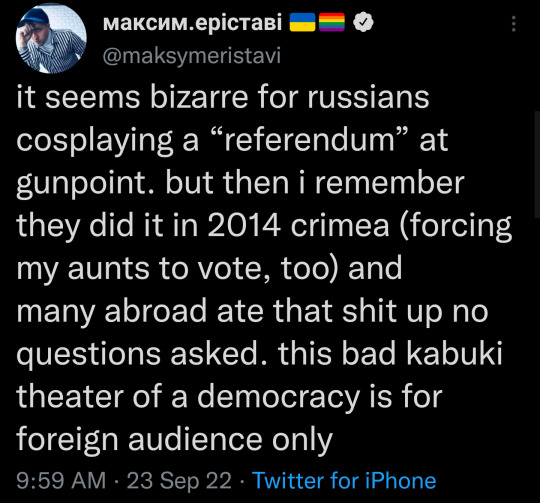
#russia#russian invasion of ukraine#russian propagandist go fuck yourself#fuck russkiy mir#russian imperialism is still imperialism#ukraine
2K notes
·
View notes
Text
I wanna talk about триган (aka the russian dub/translation of trigun)
i haven't watched 98 in russian, but i did watch tristamp and have seen the fanart/fic in russian over the years. here's all the differences i can think of off the top of my head:
the BIG one!! there's no 'stampede' anywhere. which makes sense bc there's not really a great word for stampede in russian... бегство или движение? хз. the word they use instead is hurricane (ураган).
i've seen him called 'humanoid typhoon' (гуманоидный тайфун) but i think it must be more from the 98 anime or maybe manga? in tristamp dub they just called him 'person hurricane' or 'person typhoon' (человек-ураган/человек-тайфун) which i think sounds so much better tbh
at least for tristamp it seems you can tell who's watched sub/dub in vashwood fanfics based on vash's nickname from woowoo. cresty/combhead? (хохлатый) is from sub and shaggy (лохматый) is from dub as far as i can tell. idk abt 98 or manga. in fanart especially i often see something relating to hedgehog too (ёж/ёжик/тд)
not in tristamp but i need to get it off my chest: they did our hornfreak dirty. in the manga they apparently call him mad/crazy musician (безумного музыкант) which has NO FLAIR OR STYLE at all. the freak deserved better
this one isn't different i just love the name millions knives in russian (миллионс найвс). like i get that it's not a name that should be translated bc it's literally his name and not just him being millions of knives but still. i almost expected them to use the russian word for knives (как миллионы ножей). i dont know why. the russian-accent-knives is fun to say though so i love it (i kratkoe my beloved)
#tristamp#trigun#trigun stampede#trimax#vash#nai#триган#millions knives#комментарии только приветствуются#ESP if u read manga po-russkiy bc i obvs didnt
45 notes
·
View notes
Text


Cid wanted to say hi.
58 notes
·
View notes
Link
One of the pretexts Putin used for his imperialist war of aggression against Ukraine was the alleged existence of Nazis there. Never mind that there are more Nazis in the Kremlin and on Russian state TV than in all of Ukraine.
So just who is entertaining Putin’s troops who are getting ready to commit war crimes? Nazis – of course.
A neo-Nazi band with lyrics about “white power” and “Aryan destiny” shot a music video at a Russian army base, featuring masked soldiers from a unit of soldiers drawn from the far-right hooligan scene.
The incident underlines overt right-wing extremist sentiment within sections of the Russian military, further exposing the hypocrisy of the Kremlin’s propaganda claims about “de-Nazifying” Ukraine. It’s also shone a spotlight on the 106th Airborne Reconnaissance Detachment “Moscow,” a Russian army unit based in the city of Tula, south of Moscow, which is distinctive for recruiting members specifically from the football hooligan and ultranationalist movements – themselves hotbeds of radical right-wing ideology.
The band, Russkiy Styag, which translates as Russian Banner, released the video for its track “We” to its social media channels last month, with a statement that it was “filmed with the support of the commanders and fighters of the ‘Moscow’ [unit] of the 106th Airborne Division.”
The video features Russkiy Styag’s lead singer performing in what appears to be the “Moscow” unit’s base in Tula, flanked by masked soldiers and with a poster featuring a neo-Nazi black sun symbol displayed prominently in the background.
The band did not just wander into the base. The far right in Russia are among the most enthusiastic supporters of Putin’s war.
The cosy relationship between the army unit and the neo-Nazi group is a vivid display of the apparent tolerance – or in this case, open embrace – of right-wing extremist ideology among Russian forces. Alongside the overt neo-Nazi orientation of paramilitaries fighting on the Russian side of the conflict, it cuts against the Kremlin’s already widely-dismissed efforts to paint its bloody invasion of its neighbour as a push to somehow eradicate “Nazism” in Ukraine.
These folks are so obviously Nazi that even the Trump State Department designated some of these Russian groups as “white supremacist terrorists“ in 2020.
But experts say the Russian depiction of Ukraine as a hub of Nazis, in a bid to justify a war of imperialist aggression, is perverse, especially given the role of Russian neo-Nazi paramilitaries like Rusich and the Russian Imperial Legion, designated by the United States as a white supremacist terrorist organisation, and Russian President Vladimir Putin’s longstanding instrumentalisation of the ultranationalist far-right.
Tankies in the West who practice bothsiderism in the war or who retain some residual affection for Russia on the basis that it’s the successor to the glorious communist USSR are effectively turning a blind eye to Naziism. Genuine anti-Nazis want Putin and his clique to lose this war.
#invasion of ukraine#russia#vladimir putin#nazis#tula#nazi band entertains russian troops#russkiy styag#white supremacists#fascists#extremism in russia's military#rusich#russian imperial legion#the real nazis are in the kremlin#россия#владимир путин#путин хуйло#империализм#нацисты#фашисты#армия россии#тула#русский стяг#106-я гвардейская воздушно-десантная#русское имперское движениe#русич#вторгнення оркостану в україну#геть з україни#україна переможе#денацифицировать россию#слава україні!
8 notes
·
View notes
Video


Karma
Darya Dugin Assassinated
Alexander Dugin’s daughter, Darya was killed in a car bombing in Moscow tonight.
Dugin is probably the most famous currently living proponent of the imperialist “Russkiy Mir” ideology apart from Putin himself.
Dugin raised his daughter Darya to become the same type of mysticist neo-fascist that he is.
Dugin argued that Russia should foment “ethnic, social and racial conflicts, actively supporting all dissident movements – extremist, racist, and sectarian groups, thus destabilizing internal political processes in the U.S.”
He also talks about supporting isolationist tendencies
She never rebelled against her father’s hateful ideology.
In the months ahead of that car bombing that killed her tonight, she called Ukrainians “subhumans” & said 🇺🇦 must be conquered.
#2022 russian invasion of ukraine#2022 russia-ukraine news#ukraine#russia#Alexander Dugin#Darya Dugin Assassinated#Putin's Rasputin#imperialist 'Russkiy Mir' ideology#mysticist neo-fascist#hateful ideology#hate#hate speech#racist#vladimir putin#karma
20 notes
·
View notes
Text
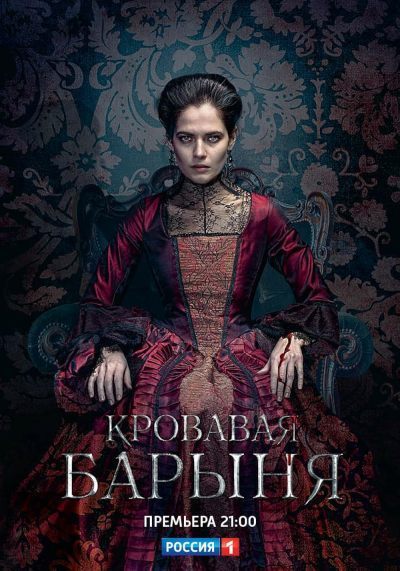

ROUND 3: GROUP A
#round 3#bloody lady#bloody duchess#Krovavaya Barinya#russian ark#Russkiy kovcheg#russian period dramas bracket#period dramas#tumblr bracket#polls#tumblr polls#russian period dramas
0 notes
Text
Rossiiskii and Russkii
'The nobles' Russianness was very different from that of the peasants, and for that matter of most merchants and clergymen. It was an imperial Russianness, centered on Cadet Corps, Guards regiment, and imperial court, and imbued with social and cultural values derived from France and Germany. Even their landed estates were islands of European culture in what they themselves often regarded as oceans of semibarbarism. The Russianness of the village was important to them, but they knew it was something different. This is the split between rossiiskii and russkii, between imperial and ethnic Russia, which became crucial during the nineteenth century. A Russian nation could not be created without amalgamating the two, but the pressures of empire tended to drive them ever further apart.'
Russia and the Russians, by Geoffrey Hosking
0 notes
Text
สปอยหนังฝรั่ง Russkiy Reyd ฉะ อัด ซัดไม่เลี้ยง (2020)

1 note
·
View note
Text

Russian embroidery pattern. Russkii narodnyi ornament. Ornament national russe. 1872.
Internet Archive
388 notes
·
View notes
Text
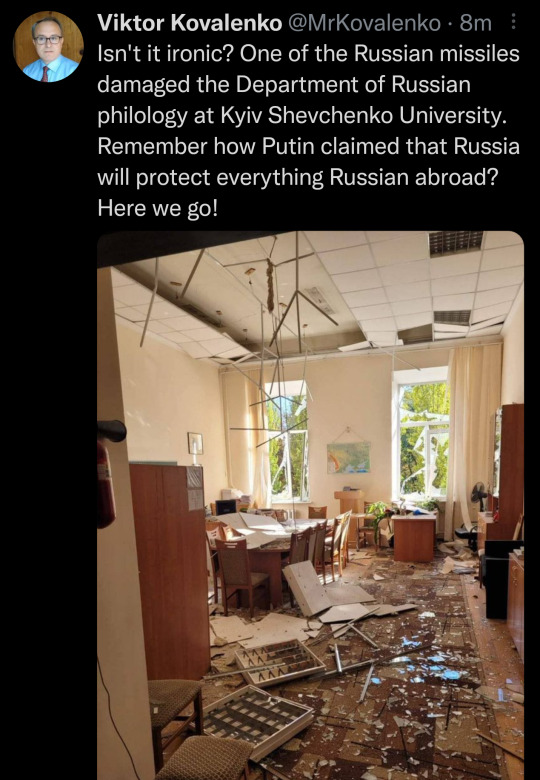
116 notes
·
View notes
Text
Napoleon has entered the corset discourse. It is the assassin of the human race and murders women, apparently.

Book: The Lure of Perfection, by Judith Chazin-Bennahum.
There were a lot of changes regarding corsets during the Napoleonic era (along with panniers, wigs, fabrics, waistlines). It was kind of a meme for certain people to be scandalized by the fashion changes women were choosing to make, such as not wearing corsets. Many of these changes were seen as immodest and immoral.
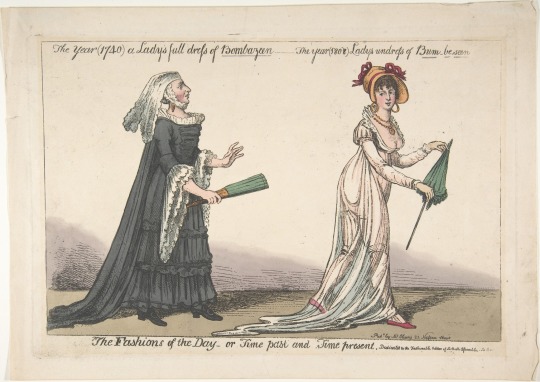
After George Murgatroyd Woodward
In Russia in 1808, there was a piece published in Russkii vestnik listing the defects of women who were being influenced by Napoleon and foreign trends. It said these women had “blind passion for destructive fashions” as well as being guilty of “reading novels,” “ignorance of their native language,” and “indifference and inattention to their compatriots.”
Source: The Russian Representation of Napoleon: A Cultural Mythology, by Molly Williams Wesling.
#napoleon#napoleon quote#quote by Napoleon#fashion#Jean-Nicolas Corvisart#Corvisart#France#french history#fashion history#Napoleon quotes#quotes by Napoleon#napoleonic era#napoleonic#history#corsets#napoleon bonaparte
95 notes
·
View notes
Text
I realised what I felt when I was a kid and watched hetalia fandom from afar.
It felt like watching my own country, my land being raped. I just didn't look at it. It was none of my business, I said. It's just a stupid manga, I said, just several hundreds of idiots. It has nothing to do with reality, I said. I already knew how russkiy mir looked like in Belarus and what russkiy mir did to my mom, but I just wanted to live in my little peaceful real world.
I didn't look at it because it simply was unbearable to look at. Although, I myself did not fully understand why.
Then russkiy mir knocked to my home. I still forbid myself to remember my home, I will think about it tomorrow, I say. I suddenly realised myself in Lithuania, going to studies in a different institution, different people, different language, choir, swords, I have no idea what I am doing and I am scared, dances, activities, posting art on tumblr. Life was good. Life was actually really good. Way better than in Ukraine. The issue was that I still wanted to die, which was terribly unfair to people who tried so hard to make me feel better, and I still was losing weight, hair, sleep, health. I couldn't remember when I ate the last time, what I ate. I couldn't remember the names of people I've learned mere minutes ago. I couldn't smell my own sweaty and dirty clothes. I couldn't see the dust on my floor and my dirty dishes. I didn't feel physical pain. I didn't feel cold. I didn't feel hunger until I was losing consciousness. I've cried a lot for no reason at all, publicly, though. Time has stopped.
There was something that prevented me from healing.
That was the moment I stopped writing the sentimental memoirs about my family and wrote "Lithuania", "Ukraine" in tumblr search for the first time.
And then I met my greatest enemy face to face for the first time, under the tags of the only things in the world, which give me the meaning of life.
My greatest enemy gave me a reason to live on. My greatest enemy gave me the opportunity to pour out my hatred in a healthy way. My mom, after all, poured it out via domestic violence. Watching people drawing my countries being russia's sisters, I didn't feel such big hatred even when my family was shelled with russian missiles. It was such a great hatred that it replaced my love for Jujutsu Kaisen, family calls, guitar and other stuff that used to bring me joy, but moreover, it replaced my apathy.
Then I started drawing hetalia fanart. I didn't want to be Stierlitz from the famous anecdotes. I didn't plan to make any friends here. I came here with a drawn sword for a specific purpose and desire to protect my land. Honestly, I am still surprised I managed to make friends here. For me, hetalia is on the same level as kremlin in terms of the degree of pollution. But I guess, it's just another proof that good people can be found anywhere, even in the educational ass of the world.
Then I learned about rusliet, and for the first time since I've left my home, I felt fear. Lithuania is everything I have, it's my Tara, and I am Scarlett. I have no other place to go. It's the land whom I love dearly and whom I want to see happy and blooming. Lithuanians in hetalia don't feel what I feel when seeing rusliet because they didn't experience what I did, and I pray to God for things staying that way.
I promised myself that I would be careful, but I would never, never ignore people offending my land and putting it in danger. You come to my land with malice in your heart or with zero thoughts in your brain - you leave with my sword sticking out of your ass.
I am worried that training this community turns me into a monster myself. I hope I don't look like a monster to my friends. Sometimes, I act like one to my family, and then I feel the great guilt, but they got used to that the same way I got used to my mom breaking plates. Although I've come here with great hatred and anger, I still can't find any malice in my heart, and I still don't receive any satisfaction from causing pain.
You can say hetalia is my destiny, just like gaining Lithuania. I finally understood what love for one’s land is. I perceive Lithuania as my land as well, and I will gnaw the throat of anyone who dares to take it from me.
I have the goal in life: to protect my land, to protect the people I love, even if I never manage to become myself again.
20 notes
·
View notes
Link
I’ve said it in several previous posts; nobody since the end of World War II has done more damage to Russia than Vladimir Putin. In that context, Putin is Russia’s greatest enemy.
Putin’s aim has been to destroy Ukraine as a national entity. That includes eradication of its culture. What has happened instead is that people in Ukraine in addition to other countries now want nothing to do with Russian culture.
“I was a Russian speaker until 24 February,” said Adeline, an art student from the now Russian-occupied town of Nova Kakhovka, referencing the date of Russia’s full-scale invasion earlier this year. Russia has failed to take over Ukrainian culture, she said, so now it has set out to kill it. Several other Ukrainian students told me they find “the spirit of freedom” in Ukrainian literature, but of subservience to power in Russian literature.
Tetiana, a refugee from the ruthlessly bombed and destroyed city of Mariupol, had suffered without heat, light or water in a cellar under constant bombardment, seen her best friend killed by a Russian missile, and then had a traumatic odyssey of escape. Tetiana not merely speaks much better Russian than Ukrainian; her mother is actually from Russia, as are her parents-in-law. The Russian president would consider her a Russian. So I asked her for her message to Putin. She replied that she would like to kill him.
Wherever I turned, in every conversation, there was a total rejection not just of the Russian dictator, not merely of the Russian Federation as a state, but of everything and almost everyone Russian. Polling by the Kyiv International Institute of Sociology shows that some 80% of Ukrainians had a positive attitude to Russia in 2013; by May 2022, the figure was just 2%. A university lecturer told me that his students now write “russia” with a small initial letter. “I don’t correct them.”
Some pre-war stats suggest that roughly 22% of Ukrainians spoke Russian as a first language. President Volodymyr Zelenskyy himself grew up speaking Russian. Now there is an abject hatred of all things Russian in Ukraine.
While this attitude might be expected in a country where Russia is committing acts of genocide, it is not limited to Ukraine.
In Georgia, a strong resentment of neoimperial Russia is more than understandable, since Russia has occupied roughly – a fifth of the country’s sovereign territory (in Abkhazia and South Ossetia) since 2008. But following the invasion of Ukraine, that hostility has enveloped almost all Russians. Ironically enough, this impacts the many tens of thousands of Russians who have fled to Georgia precisely to avoid being conscripted into fighting in Putin’s war against Ukraine. Georgians ask: why don’t you protest back home? Or as one banner put it, “Putin is killing people in Ukraine while Russians eat khachapuri in Georgia.” (Khachapuri is the distinctive Georgian cheese bread.)
Actually, khachapuri is best described as a Georgian equivalent of pizza. But you get the idea.
There is also high profile resentment of Russia in Kazakhstan.
On YouTube, you can watch a magnificent excoriation of the bullying Russian ambassador to Kazakhstan, Alexey Borodavkin, delivered in fluent Russian by the Kazakh journalist Arman Shuraev. “Russophobia is all that you have achieved with your stupid actions,” he says. If Russia invades Kazakhstan as it has Ukraine, “the entire Kazakh steppe will be strewn with the corpses of your conscripts … You are idiots. You are cannibals who eat themselves.”
“Borodavkin,” he concludes, directly addressing the ambassador, “if you want to see Nazis and fascists in Kazakhstan, look in the mirror and you will see the main Nazi and fascist. Glory to Ukraine! Forward Kazakhstan!”
The cultural concept of “russkiy mir” (”the Russian world”) began in a somewhat benign way after the collapse of the Soviet Union. But Putin hijacked it and has used it as an imperialistic justification for his military adventures.
The notion of russkiy mir was revived and repackaged in the late 1990s as a kind of Russian soft-power initiative (mir means peace as well as world). In 2007, a Russkiy Mir Foundation was created by presidential decree. This was presented as a Russian counterpart to the British Council or Germany’s Goethe-Institut, but the concept was then weaponised by Putin to justify his war of recolonisation in Ukraine. He explicitly mentioned the term in a speech justifying the annexation of Crimea in 2014.
The entirely predictable result: revulsion against his recolonisation wars has extended to the whole broader notion of a Russian-speaking world.
Outside of Russia, russkiy mir/the Russian world is usually used in a derogatory way. You may read or hear this expression in the media when Ukrainians or others talk about Putin’s territorial ambitions.
Instead of killing Ukrainian culture, Putin’s invasion is inflicting serious damage on Russia’s international cultural standing.
Russian culture is thus a collateral victim of Putin’s self-devouring cannibalism. There was an alternative future in which Russian-speaking culture, like today’s English-speaking culture, may have become multiculturally enriched by authors and artists from all its former colonies. What would contemporary English-language literature be without authors from India, Africa and Oceania? And, after all, fine contemporary Ukrainian writers such as Andrey Kurkov write – or should I say wrote? – in Russian.
[ ... ]
In the end, Vladimir Putin will go down in history not merely as the man who failed to restore the Russian empire, but as the destroyer of the Russian world.
Indeed. No matter what happens, history will regard Putin as a loser. Future generations in Russia will despise him the way modern Germans hate Hitler. Those who try to overthrow Putin would be regarded as true heroes in Russia’s future.
EDIT: Here is the vid (with English subtitles) of Kazakh journalist Arman Shuraev telling Russian Ambassador Alexey Borodavkin and Russia to fuck off.
youtube
#invasion of ukraine#russia#vladimir putin#the russian world#russkiy mir#genocide#imperialism#arman shuraev#alexey borodavkin#kazakhstan#georgia#timothy garton-ash#русский мир#қазақстан#арман шураев#алексей бородавкин#алға қазақстан#საქართველოს#россия#владимир путин#путин хуйло#долой путина#военные преступления#россия - террористическая страна#геноцид#путин – это лжедмитрий iv а не пётр великий#вторгнення оркостану в україну#україна переможе#слава україні!#героям слава!
3 notes
·
View notes
Text
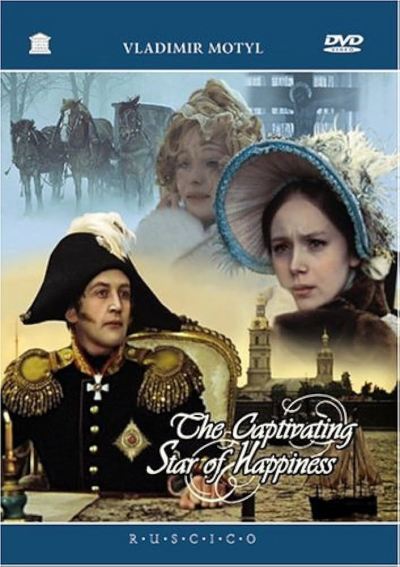

ROUND 2: GROUP A
#round 2#russian ark#Russkiy kovcheg#The Star of Captivating Happiness#Zvezda plenitelnogo schastya#star of captivating happiness#russian period dramas bracket#period dramas#tumblr bracket#polls#tumblr polls#russian period dramas
0 notes
Text
Memorials to victims of Stalinist repression in Russia are disappearing or being vandalised amid increasing attempts to rehabilitate the Soviet dictator.
For the past nine years, more than 700 plaques have been put up in Russia and elsewhere, commemorating the final residences of people who died in Stalin's purges in the 1930s.
Since May, however, dozens have disappeared in several Russian cities, according to Oksana Matievskaya, who is part of the plaque project Posledniy Adres (last address).
Police are not investigating the issue and Ms Matievskaya believes this is no coincidence.
"The memory of the Soviet terror challenges the concept of the state always being right and is, therefore, inconvenient for the Russian authorities. Especially following the invasion of Ukraine," she said.
Millions of people described as "enemies of the people" were sent to Soviet labour camps, known as the Gulag, and 750,000 were summarily murdered during Stalin's Great Terror in the 1930s.
Other memorials are also being targeted.
At least 18 monuments to victims of repression as well as foreign soldiers who fought in World War Two have been reported stolen or vandalised since February 2022. Most are dedicated to Polish nationals.
In October, a brick memorial to a prominent Polish priest was torn down and destroyed in the city of Vladimir.
A concrete cross erected in Komi republic, in memory of Polish prisoners, was also found demolished. Police attributed its destruction to bad weather and declined to initiate criminal proceedings, local media said.
Soviet authorities executed hundreds of thousands of Poles after 1939. In 1940, 1.7 million were deported to Gulag camps in Siberia and Kazakhstan.
Alexandra Polivanova of civil rights group Memorial believes the damage was ordered or carried out by authorities because Moscow wants the Soviet Union to be perceived as a powerhouse rather than an oppressive state.
She suggests the government doesn't want Russians to know the truth about their tragic past, especially now that Russian soldiers have been accused of war crimes in Ukraine.
"The authorities try to erase the memory of the crimes of that empire to cover up or justify the crimes of this one."
This is taking place alongside a resurgence in Stalin's popularity.
In July, a survey by independent pollster the Levada Centre suggested that 63% of Russians had a favourable attitude towards the Soviet leader - his highest approval rating in 13 years.
The explanation behind his rising popularity is not certain but Russian propaganda justifying the war with Ukraine has also glorified its Soviet past.
And unlike memorials to his victims, those to Stalin have increased in number.
An investigative channel on social media site Telegram called "We can explain" says there are 110 Stalin statues in Russia - 95 erected during President Vladimir Putin's rule and at least four during the full-scale invasion of Ukraine.
Some Russians want even more. In August the private Russkiy Vityaz (Russian Knight) Foundation inaugurated an 8m-high statue of Stalin in the town of Velikiye Luki, and is collecting money for more.
Its website argues these monuments are crucial given that Russia is fighting "a real Patriotic war". The "Great Patriotic War" is how Russians describe the 1941-1945 war between the USSR and Nazi Germany. The Kremlin regularly compares Russia's invasion of Ukraine to World War Two.
Russkiy Vityaz, which is said to have been founded by the Russian Special Forces Veterans Association, has declined to comment on the reasons for its campaign.
52 notes
·
View notes